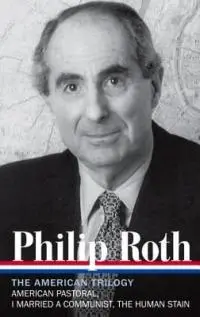Roth image via Wikipedia Commons — Flag image by Karolina Grabowska via Pexels
I've been asked to write about Philip Roth. According to the editorial guidelines, this should be neither a simple “review” of any one of his novels nor a cold, general overview of his work. That suits me. Philip Roth doesn’t fit in neat categories, and it’s only right that I should try to be intimate and critical at the same time.
The Library of America is releasing its latest anthology of Roth novels right now--his American Trilogy. Of those three novels, two of them rank among my favorites: American Pastoral and The Human Stain. The third, I Married a Communist, I do not much appreciate, for reasons I will explain. Taken together, the books in the American Trilogy make a mighty introduction to the best and the worst of Roth’s late fiction, exemplifying what’s incredible about it and what is less impressive.
Roth has been praised and vilified throughout his career. In the same breath he can be hailed as a brilliant psychologist and as a careless sexist, a Jewish writer and an anti-Semite, a self-indulgent pervert and a careful craftsman. There’s probably some truth to all of these labels, but they are not helpful. Roth is one of the few living authors whose importance rests as much on the quality of his fiction as on the difficulty most of us have in pinning him down. He delights in shapeshifting. He’s been a postmodernist and a realist and a pornographer at different points in his career. He writes autobiography disguised as fiction and vice-versa. He contradicts himself over and over. When you have finished one of his novels, of which there are many wonderful ones, you cannot easily make up your mind about it; there is no “fundamental” Roth and I imagine that’s why he appeals to so many readers.
But there is also something predictable about him. He likes to include weird sex scenes in his books. His protagonists are narcissists. History plays an important part in even the most trivial incident he depicts. The question of Jewish identity is present all the time. Women are there for you to sleep with, and the more they fulfill your twisted desires, the more you fall in love with them. Old men keep falling in love with attractive younger women, and then they get their feelings trampled on.
 Well, that’s all part of the Philip Roth universe. There is, however, much more to it than that. In American Pastoral, a good-looking and decent man, married to a former Miss New Jersey and living in a nice little suburban house, sees his daughter transformed into a terrorist. In The Human Stain, an innocent remark by a classics professor sets off accusations of racism and misogyny against him, precipitating a tragic downfall we witness in fascinated sadness. In The Breast a man becomes a breast. Yes, a literal boob. That’s the whole novel, in a nutshell — but that same man, in the later novel The Professor of Desire, makes no mention of the breast incident, and instead chronicles his young adulthood and the history of a marriage. Then you have Nemesis, an American retelling of the classic Camus novel, The Plague, where the plague has become a polio epidemic. In The Plot Against America, Roth uses himself as a protagonist, and plays an unsettling pseudo-historical game: What if Roth had lived through the rise of Nazism in America during World War II? The experimental closet-drama, Deception, is quite simply a lot of unattributed dialogue between Roth and his lover. Our Gang is a surprisingly funny parody of the Nixon years, which ends with the Nixon character campaigning against Satan in Hell. And so on. Take your pick, because Roth rarely writes a bad novel.
Well, that’s all part of the Philip Roth universe. There is, however, much more to it than that. In American Pastoral, a good-looking and decent man, married to a former Miss New Jersey and living in a nice little suburban house, sees his daughter transformed into a terrorist. In The Human Stain, an innocent remark by a classics professor sets off accusations of racism and misogyny against him, precipitating a tragic downfall we witness in fascinated sadness. In The Breast a man becomes a breast. Yes, a literal boob. That’s the whole novel, in a nutshell — but that same man, in the later novel The Professor of Desire, makes no mention of the breast incident, and instead chronicles his young adulthood and the history of a marriage. Then you have Nemesis, an American retelling of the classic Camus novel, The Plague, where the plague has become a polio epidemic. In The Plot Against America, Roth uses himself as a protagonist, and plays an unsettling pseudo-historical game: What if Roth had lived through the rise of Nazism in America during World War II? The experimental closet-drama, Deception, is quite simply a lot of unattributed dialogue between Roth and his lover. Our Gang is a surprisingly funny parody of the Nixon years, which ends with the Nixon character campaigning against Satan in Hell. And so on. Take your pick, because Roth rarely writes a bad novel.
But he does occasionally slip. The Humbling is one of the worst novels I’ve read—sentimental, rushed, unconvincing, and ultimately silly. It has all the Roth trademarks: an aging artist, a young woman, threesomes, death. But it doesn’t have the heart, or the finesse of, say, American Pastoral, the first (and to my mind, best) volume in Roth’s American Trilogy. What makes the American Trilogy so powerful is the emphasis on how history and the personal intermingle. I Married a Communist, for instance, takes place during the 1950s, a time when you could not simply label yourself a nonconformist, or worse, someone who could be deemed unAmerican. Roth, of course, makes his protagonist a communist. If the novel is weak, it’s not because of the writing (his prose is almost always superb), but because it lacks focus. It is still a strong work, but compared to the other two novels in the trilogy, it falls short.
This new Library of America edition collects the three Trilogy novels and features notes by Ross Miller. The notes are helpful, but you don’t need to refer to them constantly to appreciate the novels. What you do need, perhaps, is an open mind. The Human Stain rails against one of Roth’s oldest enemies: political correctness. It contrives to show the failings of a culture obsessed with privacy, representation and watching your back at all times. This will, inevitably, offend some, though Roth is careful in his approach to the subject. He is in the tradition of novelists, like Orwell, who refuse to let language corrupt itself just because it suits social purposes. The offhand, inoffensive remarks made by the protagonist of The Human Stain ruin his illustrious career simply because of the alternative meaning of a single word: spooks. Does he mean “ghosts” or is he saying something only slightly less insulting than “niggers”? To his black students, he’s a racist. To the reader, it becomes painfully and even unbearably obvious that there was no racist intent in the remarks. He was referring to two students who had never attended his classes—“Are they ghosts?” But because he used the word “spooks” and because the students in question are black, it becomes tempting to everyone else simply to stir up a scandal. Sometimes, that’s humanity in a nutshell.
Roth’s fiction takes absurd or at least implausible situations and treats them as material for serious contemplation. This is precisely what so many others don’t do—it’s far easier, emotionally, to make light of something serious than to find the underlying tragedy in even the most innocent one night stand or classroom comment. That’s one of the reasons I read Roth’s fiction. Another is, quite simply: he almost never bores, and he almost always fascinates. He’s been writing since the 1950s, so clearly he’s been doing something right.
Get The American Trilogy by Philip Roth at Bookshop or Amazon

About the author
Phil Jourdan is a writer, musician and distinctly unenlightened person. He is structural editor at Angry Robot, and a co-founder of Repeater Books and Litreactor. He splits his time between the UK and Argentina.







